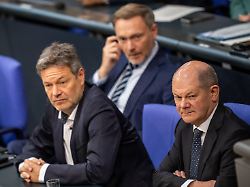“First, real recession”
US economist disturbed by the direction of the traffic light
January 17, 2024, 10:03 p.m
Listen to article
This audio version was artificially generated. More info | Send feedback
The US economist Posen is one of those who have long admired Germany’s development. In an interview, he appears all the more irritated by the current development. Given the strength of the AfD, he cannot understand the planned extensive cuts due to the debt brake.
US economist Adam Posen is concerned about the AfD’s recent electoral successes. “I have lived in Germany several times since 1992 and have always admired what Germany became after the war,” Posen told Spiegel at the World Economic Forum in Davos. “That’s why this is particularly disturbing to me now.”
Against this background, Posen, who is also President of the Peterson Institute for International Economics, described the fact that the federal government is planning extensive cuts in view of the debt brake as problematic. “Germany is currently going through its first real recession in decades, the AfD is partly ahead in the polls – and we know from history that austerity feeds radical parties.”
It doesn’t matter to him whether the debt brake is reformed or scrapped, Posen continued. He just doesn’t want “these sharp pro-cyclical cuts that the federal government has to make now – in the middle of a recession, and in a year with important elections.” What is crucial is that there is too little public investment in infrastructure, education and renewable energies in Germany.
“Governments need more money”
Posen spoke out in favor of significantly expanding the taxation of CO2 emissions. “Governments need more money and they need to increase taxes and duties.” In this context, he would also “think about wealth taxes.”
With a view to the current protests by farmers, Posen said that the federal government should not give in to “blackmail.” “If you give the subsidies for two more years and the farmers go home with their tractors, the government may be able to turn its attention to more important problems,” said Posen. “But that doesn’t always work: What if you give them something and then they want more?”
